Hello there, fellow adventurer! Good to see another friendly face.
Whether you got here from Stranger Things, Baldur’s Gate 3, Critical Role, or your mother’s basement, I’m warning you now: you’re trapped. Nope, too late, it’s already happened. This new hobby of yours may or may not take you down paths you’ve never dreamed of going down, for better or worse.
Want to get a taste of D&D for yourself? Click through the images to dive into your adventure!
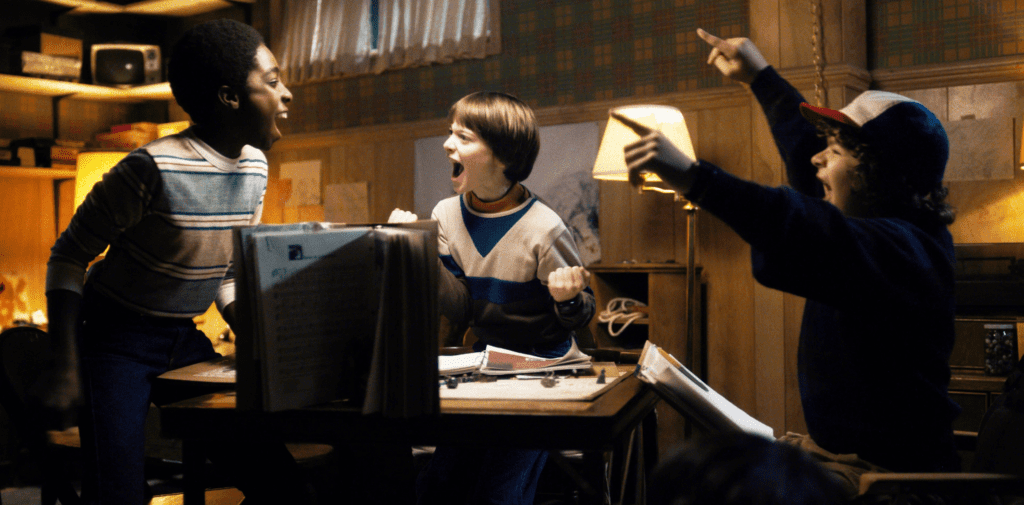
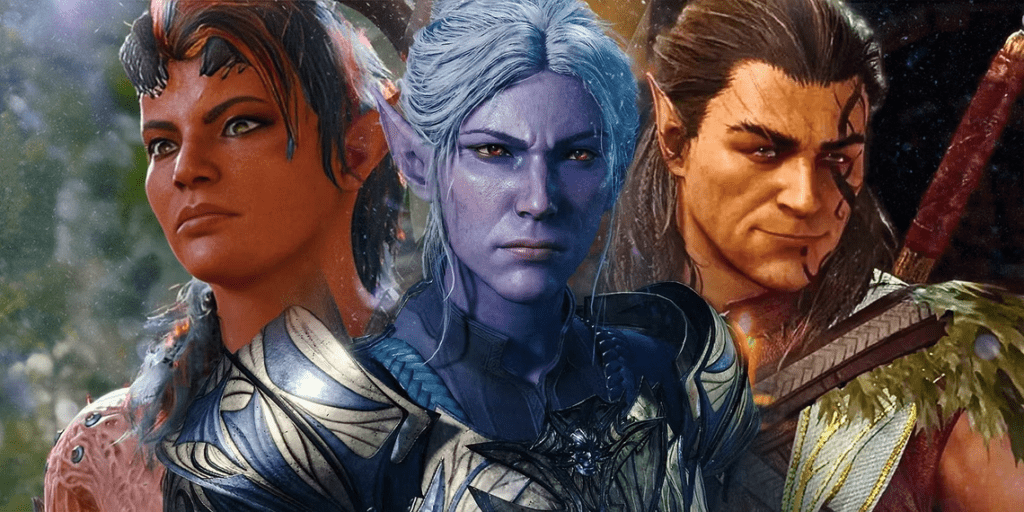
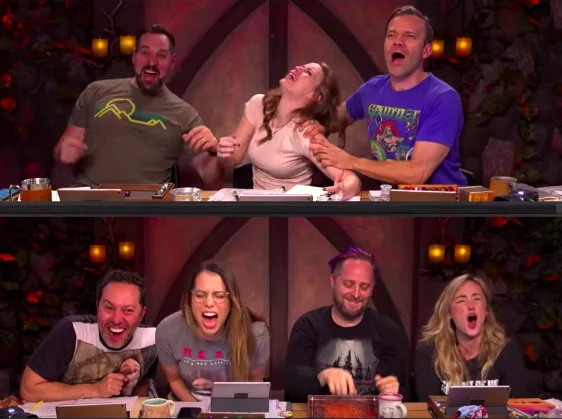
What Is Dungeons & Dragons?
Imagine a game where you can be anyone you want, from a brave knight following their faith, to a magical centaur cowboy, and explore mystical worlds filled with adventure at every turn. That’s D&D in a nutshell.
Essentially, it’s a fantasy tabletop role-playing game where players create their characters and embark on adventures crafted by the Dungeon Master (DM), who is the game’s storyteller and referee.
The Basics: What You Need to Play
Let me start this off with a controversial take: while it’s technically touted as a tabletop storytelling game, you don’t even really need a table to play, nor dice, nor even specific rules to play D&D. At its core, D&D is about storytelling. You and your friends tell a story together, guiding your made up heroes through quests, battles, and adventures. Following a set of rules you all agree upon really helps to make this engaging, but they do not have to be published straight from the mouth of Wizards of the Coast. That being said, it’s a lot easier to get started when you have a basic idea of how to play. Break the rules after you get to know them, so to speak.
While you do not need anything but your imaginations to play, it certainly helps to have these items:
- Dice: The lifeblood of D&D. The most important is the 20-sided die (d20) used for most checks and attacks. You can literally google “d20 dice roll” and get a roll, but boy does collecting those little clackity trinkets get addicting fast. These also make easy gifts for your nerd friends.
- Character Sheets: Where you keep track of your character’s abilities, equipment, and backstory. Again, digital also works. I like to use the free app “Fight Club 5” (referring to the 5th edition of the game) to really hand hold you through making your first character.
- Rulebook: The Player’s Handbook has all the rules you need to play, from character creation to combat. You can google these rules, or just follow along with your published module (think Curse of Strahd, Lost Mine of Phandelver, and Baldur’s Gate: Descent into Avernus) which will tell you what you need to know. I personally don’t think it’s necessary to buy the rulebook- just follow your campaign book or DM, and google any rules that are poorly explained.
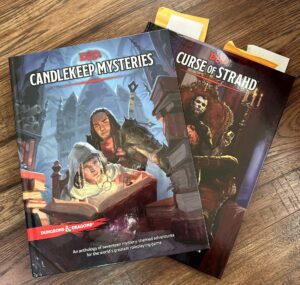
Getting Started with D&D
Choosing a Role: To Play or be Played. To Tell or be Told. Nevermind, just choose:
Option 1- Player: As a player, you create and play as your character. You decide their actions and how they react to the unfolding story.
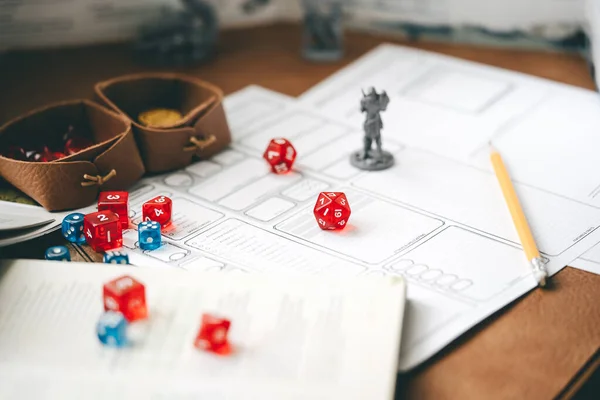
Option 2- Dungeon Master (DM): The DM runs the game, describing the world, controlling the Non-Player Characters (NPCs), and narrating the results of your actions. This is usually a role played by the most experienced member of the group.
Some say it’s less fun to be DM, but it really is just a matter of personality. For example, I love creating worlds and telling stories and making up a thousand different characters and then coming up with detailed lore-filled campaigns based around them- it’s why I play this game. This makes it easy for me to play as the DM. My friend hates the character making process, and prefers to just get on with the action, making him better suited for the player role. No matter what, just make sure that both parties know the rules, or have accepted the same set of rules.
Understanding the Rules
While D&D has rules, they’re more guidelines to ensure everyone has fun and the game runs smoothly. The key ones involve character creation, combat mechanics, and skill checks. Check out this link here for the official set of basic rules.
Playing the Game
During the game, you’ll explore lands, interact with characters the DM presents, and embark on quests. The core of the gameplay involves:
- Role-Playing: Acting out your character’s actions and decisions. This is where you can be creative and immerse yourself in the character’s role.
- Skill Checks and Combat: When performing actions, whether convincing a guard to let you pass (using a Charisma check) or battling a fearsome dragon (rolling for attack and damage), you’ll use dice to determine the outcomes.
For the Players: Creating Your Alter Ego
Step into Another World
Imagine being anyone – a fearless warrior, a cunning rogue, or a wise wizard. In D&D, you create a character who will embark on fantastic quests. It’s not just about rolling dice; it’s about crafting a story, making choices, and watching your character grow through adventures.
Character Creation: The Heart of Your Journey
- Choose Your Race and Class: Will you be an elf, dwarf, human, or something more exotic? Each race has its unique traits. Then, pick a class – like a fighter, sorcerer, or cleric – each with special abilities and styles.
- Develop Your Backstory: Who is your character? What are their dreams, fears, and goals? This backstory will guide your decisions in the game.
- Roll for Your Abilities: Your character’s skills and strengths are determined by six key abilities: Strength, Dexterity, Constitution, Intelligence, Wisdom, and Charisma. Rolling the dice will determine your scores in these areas.
Learning the Ropes
- Understand the Basics: Read up on the basic rules, particularly around combat, skill checks, and spellcasting. Don’t worry about memorizing everything – learning happens best during the game.
- The Power of Teamwork: D&D is a collaborative game. Your party members are your allies in this adventure. Plan together, fight together, and celebrate together.
So, will you play D&D as a player? Click here to find out how to build your first character, and how they are played in the context of an example campaign.
For the Dungeon Masters: Crafting the World
The Conductor of Fantasies
As a DM, you’re the narrator and referee. You create the world, the challenges, and the story in which the players are the stars.
Building Your First Campaign
- Start with a Pre-Written Adventure: Modules like “The Lost Mine of Phandelver” are great for beginners. They provide a ready-made story, complete with characters, settings, and conflicts. The official D&D Starter Kit is my favorite for new DMs and players alike, as the campaign (Dragons of Stormwreck Isle) really hand holds you through the process. The earlier D&D Essentials Kit has the Dragon of Icespire Peak campaign. The book is okay; we played this one just fine, but the rules were a bit less fleshed out and the book didn’t really tell DMs what to do if players made certain choices- it left a ton up to improv, which is a lot to lean on brand new DMs. In short, the Starter Kit is your best bet, or, something like A Wild Sheep Chase which is free to download, read, and play.
- Know Your Story, But Be Flexible: Familiarize yourself with the plot, but be ready to adapt. Players will often surprise you with their choices. This is the hardest part for new DMs. If you’re comfortable with improv or are pretty creative, you’ll be a fantastic DM. If you like planning ahead and know your players well, you’ll also do a wonderful job.
- Set the Scene: A major part of DMing is vividly describing environments and situations. Your words paint the world in which your players act. This you can follow along with from the campaign book, or by googling some descriptive ideas. This is where the fun worldbuilding can come into play!
Managing the Game
- Rule with Fairness: Know the rules but remember that fun comes first. Sometimes, bending a rule for the sake of the story is the best choice. For example, a very popular homebrew rule (that even features in Baldur’s Gate 3) is that drinking a health potion is a bonus action, not an entire action. This really helps to keep the ball rolling in the game.
- Handling Challenges: Be prepared for players to go off-script. Improvisation is a key skill for any DM. Don’t worry about it being perfect, and it’s completely fine to pause. I think it’s best to have a combination of planning and improv. For example, say your campaign book has your players going to approach a wizard to obtain a spell book. Have a plan for if your players to decide to convince her (what would this enigmatic wizard be convinced by? A lie? Money? A favor? A sacrifice? Another quest?), steal from her (do they have full or half cover? Is it locked away? What skill check would they need to pass- 15 or higher? What would she do if she caught them?), or straight up kill her (what’s her stat block? If down to a few health points, would she beg for her life, or would she want to go out with a bang?). This can sound like a lot, but it gets easier the more you play with your specific party and can anticipate their motives. This is also where you get to add your fun little twists and traps as DM, and make choices acting as the antagonists- really embody that wizard!
Tips for Successful DMing
- Communicate: Before you start, discuss expectations with your players. What kind of adventure do they want? How much combat vs. role-playing?
- Use Resources: Online tools, forums, and videos can be incredibly helpful in planning your sessions.
- Feedback Is Golden: After each session, ask for feedback. What did your players enjoy? What could be better? This helps you grow as a DM.
Ready to create your own world for your friends to play in? Click here to find out how to DM, both with prewritten modules, and how to homebrew your first exciting campaign.

Tips for Your First Adventure
- Embrace Creativity: There’s no “wrong” way to play D&D. Be creative and think about what your character would do in the game’s situations.
- Collaborate and Communicate: D&D is a team game. Work with your fellow players and DM to create a memorable story.
- Learn As You Play: You don’t need to know every rule to start playing. Learning D&D is a journey, and the best way to learn is by playing.
- Have Fun!: Remember, the primary goal of D&D is to have fun. Enjoy the adventure, the mishaps, and the triumphs.
- Group dynamics: The tricky thing is that the DM makes the world and the story, and generally does a ton of outside work in order for the players to play the game. This usually is balanced by the fact that the DM is the rule referee. One common homebrew rule for D&D campaigns is this: what the DM says, goes. Don’t argue too much with what they say- this game isn’t all about you. Obviously, this can turn out to be very lame if you have lame friends or simply a mean DM. Remember that the game is all about having fun. Conversely, the DM can follow their own important rule known as the “Rule of Cool”: if something makes the game more interesting or fun, let it happen. No need to get rule-lawyery about every little thing. Sometimes it helps to take a step back and remember: we are a bunch of adults in a room playing pretend. Let your buddy be the time traveling swashbuckling werewolf who is avenging the death of his parents who die every month on the full moon. Or something. So, new DMs: learn to thrive in the chaos. And to you, the dark backstory loving Mary Sue: rules are what make the game a game, and not you soapboxing for three hours over cold pizza to your friends. Let other people play, and allow yourself to fail hilariously.
Finding a Group
D&D is best played with friends, but if you don’t have a group, don’t worry. Many local game shops (search: comic book stores in my area) host game nights, and online platforms like Roll20 or Discord offer a way to play virtually. It’s also a ton of fun to just play with one other person. When I first started, I thought with D&D you had to play with a group of six or eight, but after trying it, I realized that it’s honestly even more fun to play with just two people. Here’s why!

Conclusion
Dungeons & Dragons is a gateway to a world of limitless imagination. It’s a game where creativity, camaraderie, and storytelling combine to create an experience that’s as unique as the players themselves. So gather your dice, rally your friends, and prepare to embark on an adventure like no other. Welcome to the world of D&D, where the story is yours to write. Happy adventuring!
Remember, every legendary D&D player and DM started with their first game, unsure and excited. Embrace the journey, and let the dice roll where they may!

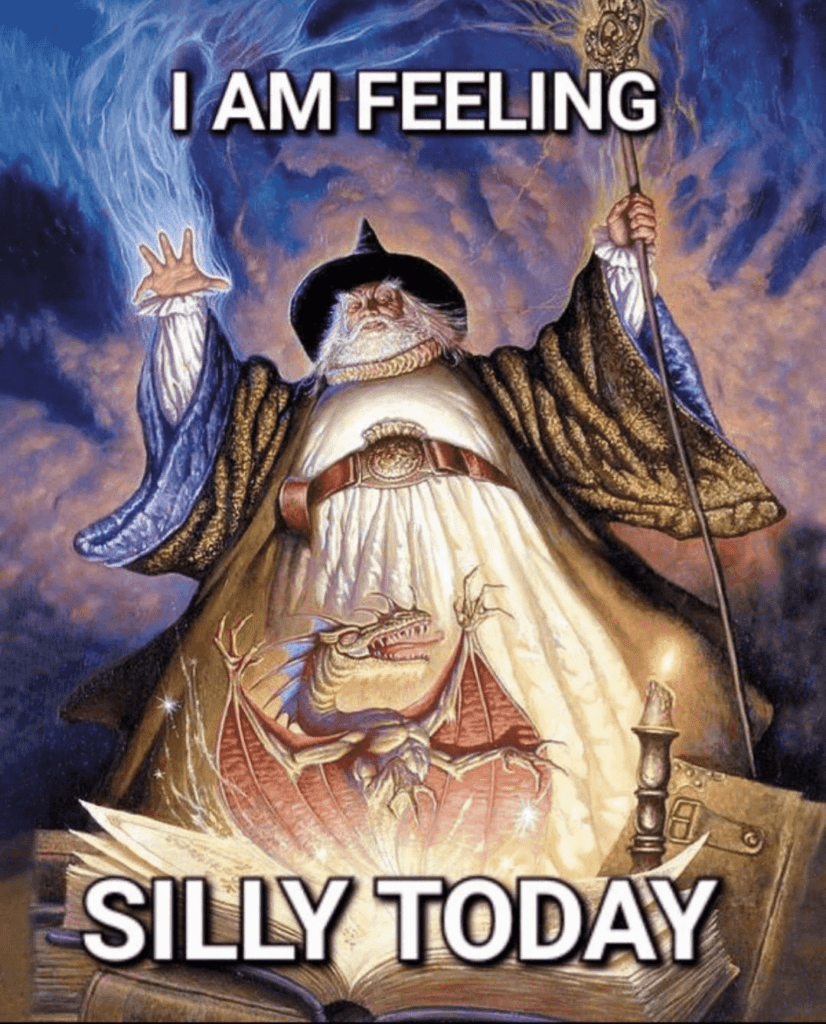






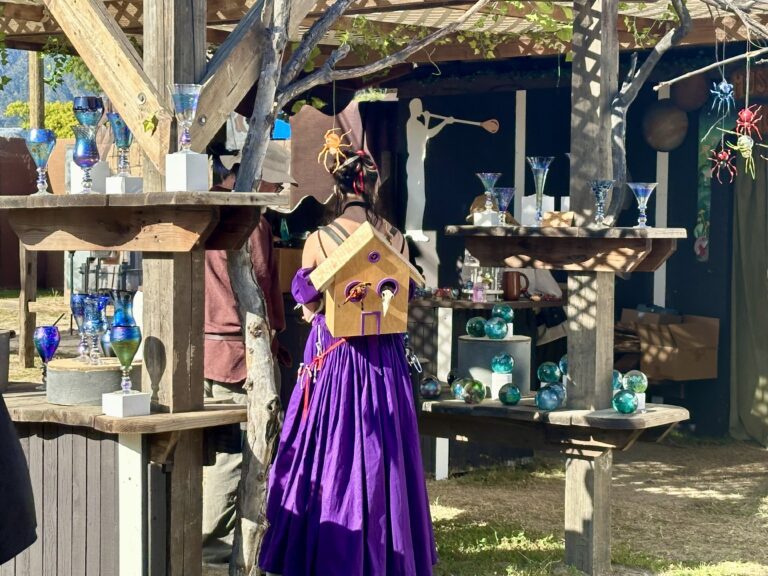

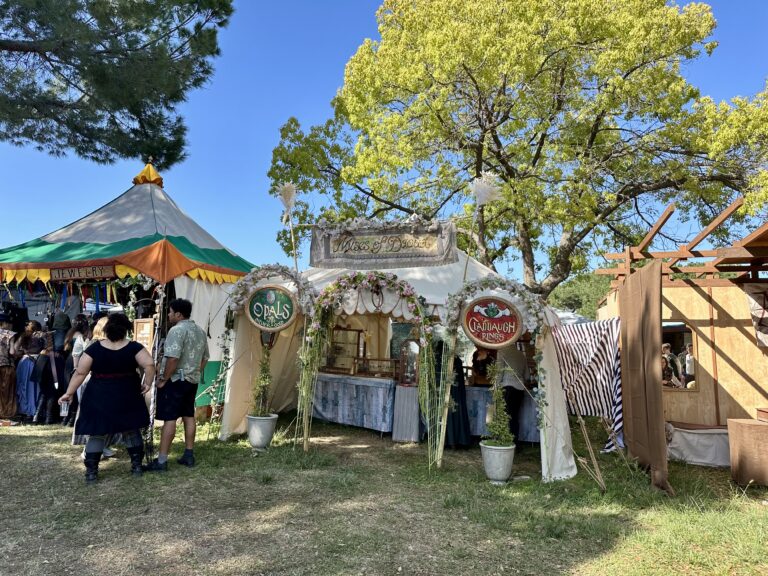
One Comment